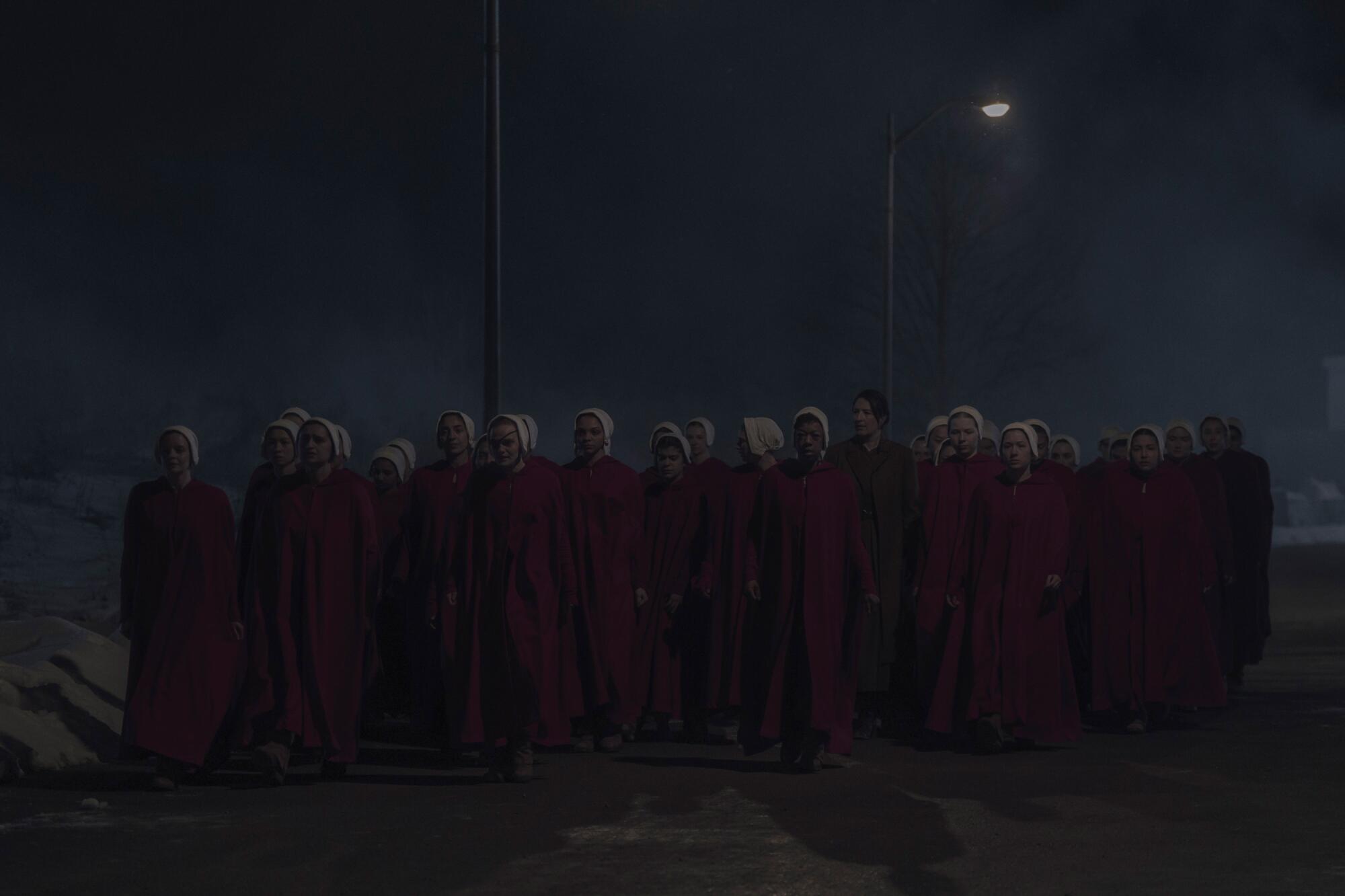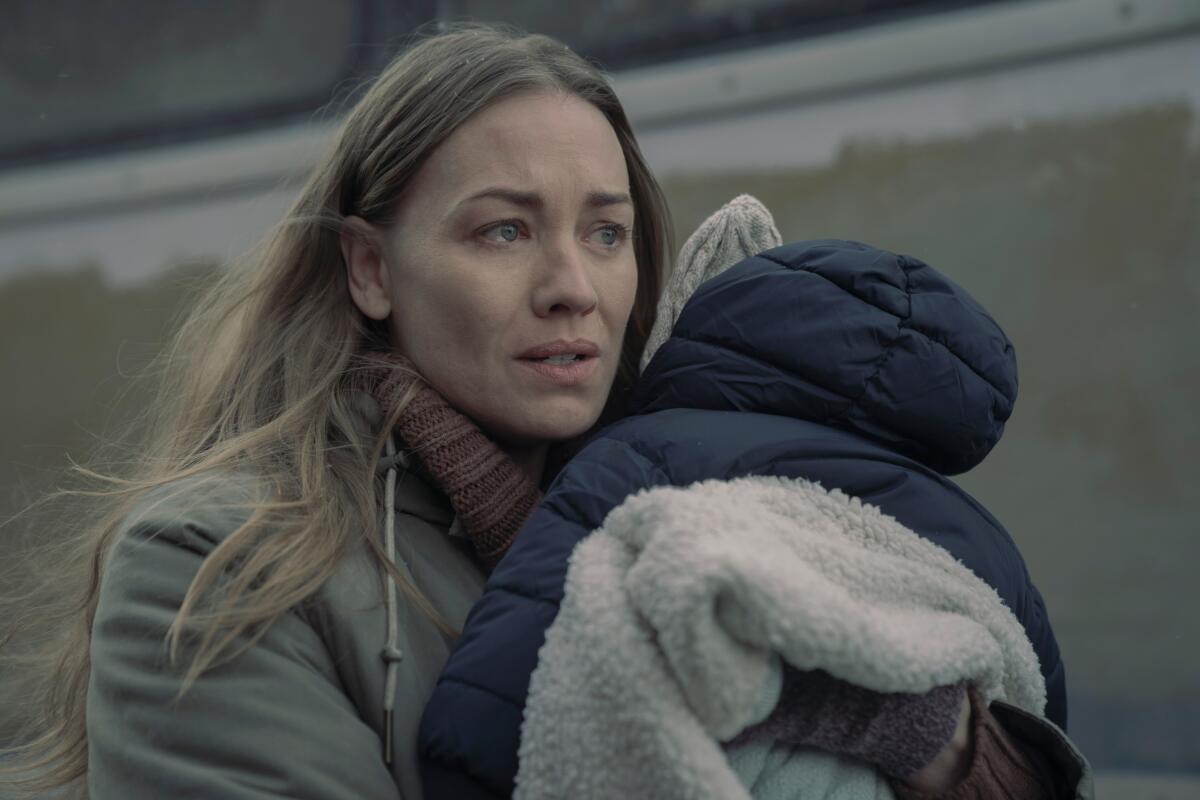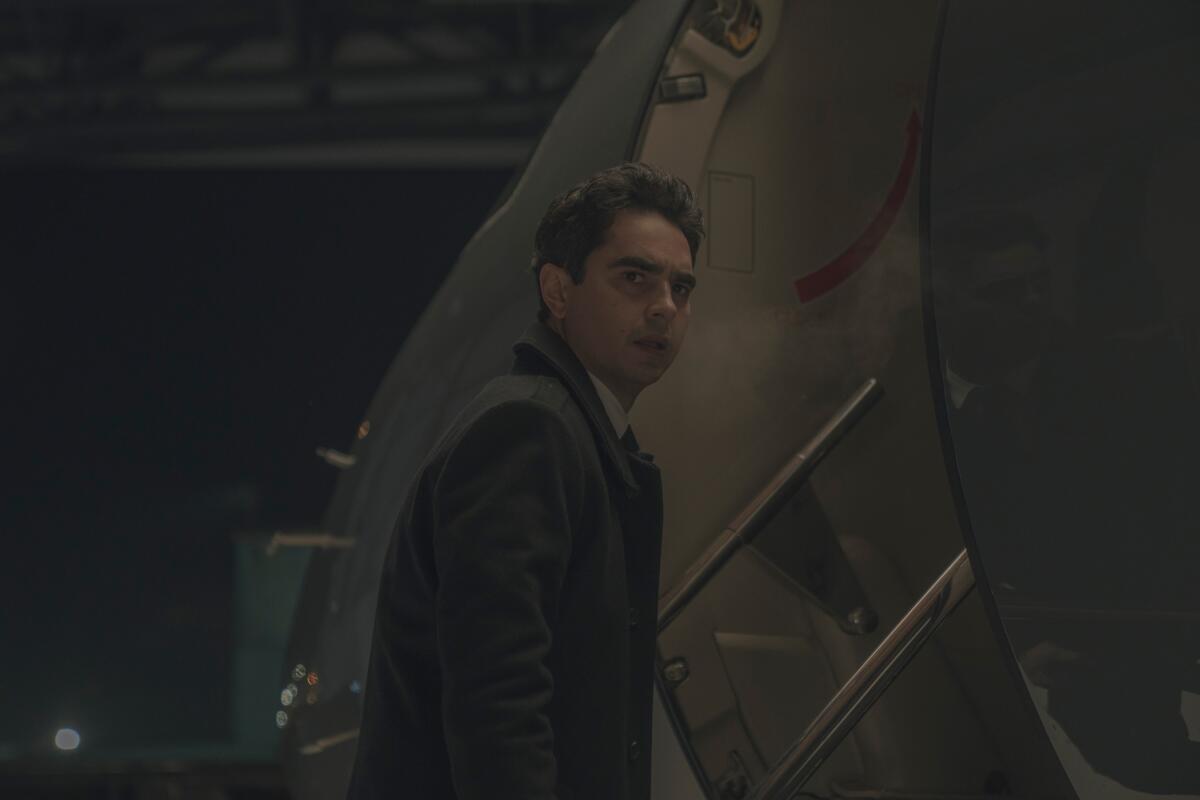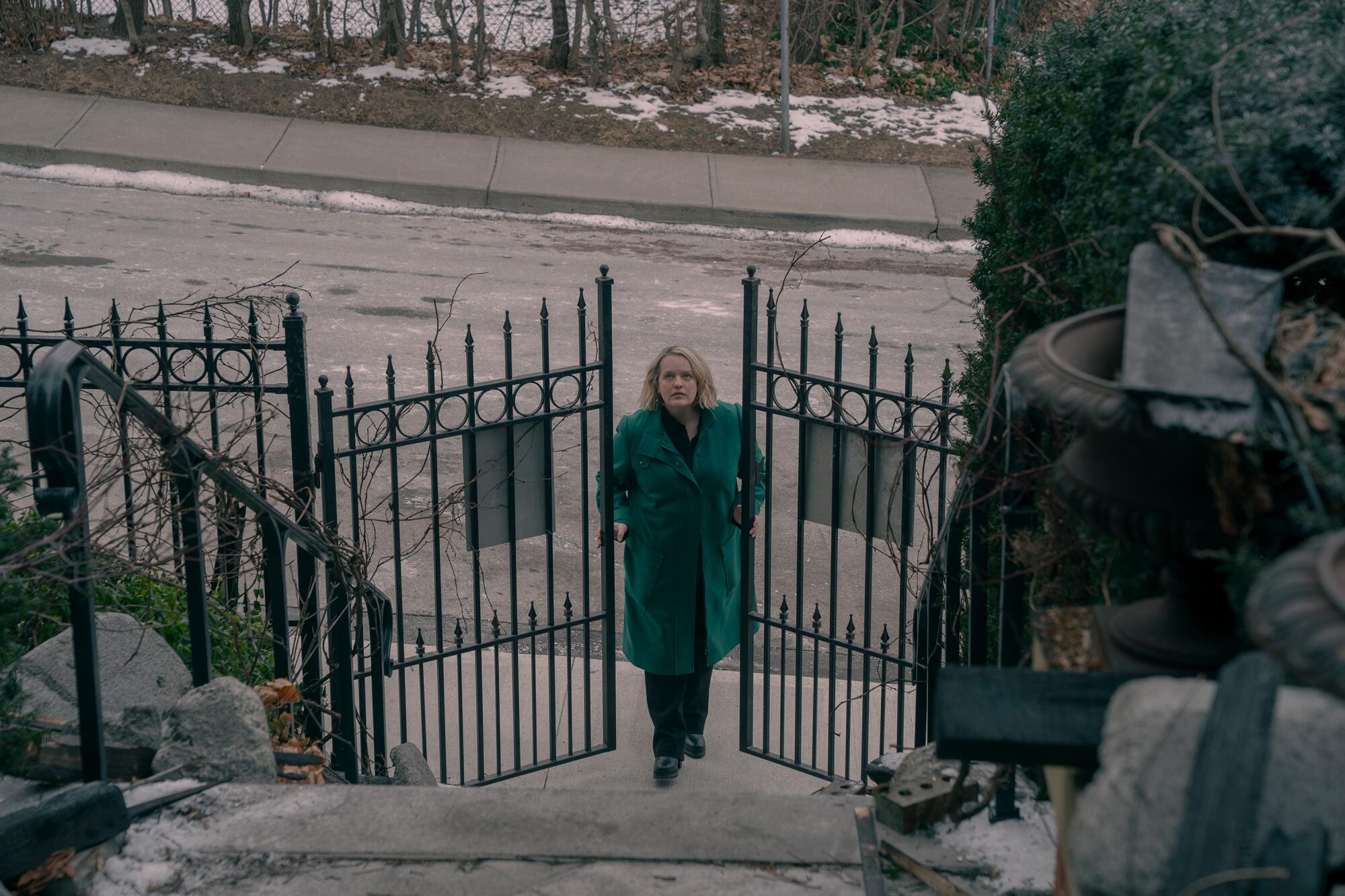This text incorporates spoilers for the collection finale of “The Handmaid’s Tale.”
“The Handmaid’s Tale” ended within the early days of a brand new starting, however with a battle that’s nonetheless removed from over. Is it hopeful? Time will inform.
After a planted bomb on a aircraft exploded and killed a number of the high commanders of Gilead, the Hulu drama concluded Tuesday with June (Elisabeth Moss) and firm determining a path ahead because the occupation of the U.S. by the totalitarian regime begins to be dismantled, with liberation taking maintain first in Boston and different elements within the Northeast. June, although, gained’t relaxation till freedom reaches Colorado, the place her eldest daughter, Hannah, resides beneath the regime.
Whereas June’s central mission all through the collection has been to reunite along with her daughter, the collection ends with solely the hope that it’s going to sometime occur. An emotional cliffhanger tied to logistics — a spin-off sequel titled “The Testaments,” based mostly on the novel written by “The Handmaid’s Tale” creator Margaret Atwood, within the aftermath of the present’s success, will launch later this yr and deal with June’s daughter, who was renamed Agnes by her new household, and the opposite younger ladies of Gilead.
Just like the 1985 Margaret Atwood novel it’s based mostly on, “The Handmaid’s Tale” offered a startling and harrowing have a look at what can occur when unchecked energy and a totalitarian mindset, mixed with spiritual extremism and social engineering designed to strip ladies of their autonomy, grow to be codified. It was by no means alleged to really feel like actual life. However Yahlin Chang and Eric Tuchman — longtime collection writers who took over as showrunners for the ultimate season from co-creator Bruce Miller, who has pivoted to adapting “The Testaments” — are conscious that some viewers see similarities between the fictional cautionary story and actuality.
The Instances spoke with Chang and Tuchman about the actual world parallels and bringing the collection to its conclusion with Miller, who wrote the finale. Listed below are edited excerpts from the dialog.
In a scene from the collection finale of “The Handmaid’s Tale,” June (Elisabeth Moss) displays on her experiences in Gilead and decides what to do subsequent.
(Steve Wilkie / Disney)
June returns to the Waterford residence the place she data her monologue, a callback to what we hear within the very first episode. Was that all the time envisioned because the closing scene?
Chang: Initially, Bruce envisioned it because the penultimate scene, however it turned the last word scene as a result of it turned so clear, in my head anyway, that June was telling the story to Hannah and for Hannah, and that the entire collection we’ve been watching has really been her story to Hannah. On condition that our palms had been tied, sadly, and we couldn’t convey June and Hannah collectively due to “The Testaments,” which was one thing that we actually struggled with — I struggled with, talking for myself — not giving individuals what they wished or what I wished, the thought of her telling the story to Hannah was simply so emotionally fascinating. I don’t assume that Bruce was so frightened about not seeing Hannah. There’s this complete sequel that focuses on Hannah. And Lizzie had an enormous a part of this too; she influenced the writing of this scene between June and Holly [June’s mother, portrayed by Cherry Jones], the place it developed right into a scene the place Holly says, “This story is for the people who have lost, who have not gotten their children back; this is for them.”
Tuchman: Understanding we couldn’t reunite June and Hannah, it was heartbreaking as a result of we’re definitely conscious of how a lot the viewers was eager for that. It gave the impression to be what was driving June over the course of the entire collection. However as soon as we came upon that we couldn’t try this, that there was that boundary that we needed to respect, once I give it some thought now, it shifted what her emotional engine turned: What does it imply to maintain going while you don’t get what you need and what you’re hoping for, and what if which may by no means occur? It really looks like a very highly effective message now — that you just hold going; you by no means cease loving and hoping and wishing and dreaming and no matter obstacles come your means, definitely as a guardian, you’re going to do no matter it takes to maintain transferring ahead. Simply to see Lizzie climbing these recreated steps of the Waterford home to Offred’s room and to finish up sitting in that window seat in that iconic pose, felt like such an virtually overwhelmingly emotional expertise as a result of it’s a whole full circle.
Tuchman: If I’m remembering accurately, Bruce obtained an early have a look at that manuscript, so we knew fairly early on about this concern that we’d not have the ability to reunite them. I feel Hulu was very captivated with attempting to provide a sequel collection, so the restriction about Hannah, we knew about by Season 4. We by no means stopped eager about methods round it. Actually this season, we had many pitches — and Yahlin had unbelievable pitches, particularly — about easy methods to perhaps fulfill that reunion with out fairly actually reuniting them.
Care to share a type of pitches?
Chang: Simply as a mother myself, I saved eager about, “What could I do, knowing that there’s the sequel.” I had pitched a pair deep flash forwards, like deep into the long run. So it’s like “The Testaments” would have needed to run for like 30 years. However I completely perceive why we couldn’t do it.

A bunch of handmaids collect simply as Gilead cracks down on the rebels within the collection finale of “The Handmaid’s Tale.”
(Steve Wilkie / Disney)
What we get is June persevering with the struggle as a result of, as she says, they’re by no means going to cease coming and never combating is what led to Gilead and it must be damaged. Do you take into account the ending a triumphant one? Is that this a victory for June?
Chang: I feel it’s triumphant as a result of she survived and she or he’s nonetheless combating. Nevertheless it’s bittersweet as a result of she doesn’t get what she needs. It’s like life. The facility of the present has all the time been that it’s like life. I do know Bruce very a lot didn’t need the finale to really feel like [raises voice to sound more authoritative], “This is a television series finale.” He wished to really feel like that is what occurs the subsequent day. And I feel you get that sense that we’re dropping in on these characters on today.
When it got here to the rebel, how did you consider what that might feel and appear? Individuals on social media had been saying they had been hoping for one more crimson wedding ceremony; for the lads to expertise torture and struggling. We obtained a few of that, however to not a excessive diploma.
Chang: Properly, as a result of there’s a very well-known “Game of Thrones” episode known as “Red Wedding,” I by no means wished it to be a crimson wedding ceremony like that. Full disclosure, I did initially envision seeing a bunch of murders, however truthfully, we didn’t have the time or the cash to shoot them. It’s a query that you just do all the time have with producing tv, when you’ve a world of restricted time and restricted funds: How do you most successfully inform the story? It felt like what you need is that this very satisfying homicide that June does of a really vile, satisfying character, [Commander Bell], which is a part of the rationale we forged Tim Simons. Once we really [conceived of] Bell from the very starting, we used Tim as a mannequin.
Tuchman: We known as him Jonah within the room due to “Veep.” We couldn’t name him Jonah Bell finally, however that was his title within the room.
Eric, with Episode 9, was there a whole lot of debate over easy methods to cope with these commanders? Was it all the time going to be loss of life by a bomb on a aircraft?
Tuchman: It was an concept that we got here up with very early on after we had been first breaking the season. I feel I discussed it in the future within the room. I do know for positive that I pitched Lawrence bringing this bomb on. I feel I additionally pitched Nick exhibiting up unexpectedly on the identical time. That was one thing that we had been aiming for as an enormous tentpole occasion afterward within the season.
To take a step again to speak concerning the revolution on the present, I feel individuals could, deservedly, have wished extra bloodlust, however it’s important to keep in mind what present that is. We wished to remain true to the type of storytelling that has been consultant of the present, a really character-driven, emotional expertise, which isn’t to say we haven’t had spectacle and we haven’t had motion. We wished to offer simply sufficient of that within the within the ninth episode, the place you see the rebellion occur and ignite, but in addition stay true to June’s standpoint. We don’t usually depart her to go off into different occasions. However what was very satisfying for me, and what I feel we actually completed this season, is getting June and Moira [Samira Wiley] again in that handmaid’s outfit, again to the start. It needed to be the handmaids to take down Boston. It’s “The Handmaid’s Tale” — June needed to be very important, important in that rebellion. She had her final alternative to spark the revolution, she grabbed it on that execution stage and she or he did it.


Serena (Yvonne Strahovski) and Aunt Lydia (Ann Dowd) within the collection finale of “The Handmaid’s Tale.” Co-showrunner Yahlin Chang on their journeys within the closing season: “We never talked in terms of what is their redemption arc. Those are characters who have willful blindness to what’s going on, and it was about how do you crack open their eyes to see the truth, then how would they react to it?” (Steve Wilkie/Disney)
What did you and the writers need out of the Serena [Yvonne Strahovski] and Aunt Lydia [Ann Dowd] arcs? They had been vital gamers to the hurt ladies confronted in Gilead. What was the dialog on what justice or redemption regarded like for them?
Chang: We by no means talked when it comes to what’s their redemption arc. These are characters who’ve willful blindness to what’s happening, and it was about how do you crack open their eyes to see the reality, then how would they react to it? In our present, the factor is that our villains undergo not from being inhuman, however being too human. They’ve all of the insecurities and fears and weaknesses of people. For Serena, it’s this narcissism and self-justification. For Lydia, it’s additionally that she’s justifying every thing by saying it’s God. Because the seasons went on, it was about peeling these away in order that they may lastly see the reality. As soon as they noticed the reality, we felt like they might most likely do the suitable factor so long as they understood how horrible it was what they had been doing.
Tuchman: One factor we all the time discuss is among the virtues of June is that she will be able to see the humanity in everybody — at the least, she hopes to the touch the humanity even in probably the most despicable characters. It’s by means of June’s affect, finally, that she breaks by means of to Lydia in Yahlin’s episode. She’s talking in a heartfelt, real means, girl to girl, and opens Lydia’s eyes. Within the following episode, there’s the scene between June and Serena, the place Serena has to surrender the data that’s going to take down that aircraft; you see June utilizing Serena’s personal devotion to God and to her baby to get up and understand there’s no hiding anymore from what’s the suitable factor to do. It’s that affect from our central character that basically transforms these two different ladies.
Of their closing change, Serena apologizes for what she’s executed and June forgives her. Have been there completely different iterations of that change?
Chang: The primary draft of [Episode] 10 didn’t convey the June-Serena scene to that place of forgiveness, however it felt vital that we get to a milestone of their relationship within the closing episode. That’s all Serena has been after. Prefer it or not, she has been seeing June as her automobile for redemption and actually wants it and actually cares about this relationship. She’s so determined for it, after which June grants the forgiveness as like a present, and likewise due to what she [Serena] did in Episode 9.



Nick (Max Minghella) and Lawrence (Bradley Whitford) within the collection finale of “The Handmaid’s Tale.” (Steve Wilkie/Disney)
You spoke earlier about willful blindness, and it made me take into consideration Nick [Max Minghella]. I struggled with making sense of this character that I believed I knew and the choices he made in the long run. However perhaps it speaks to my willfull blindness.
Tuchman: We’re very conscious that persons are very invested within the Nick-June relationship, for good purpose. Max Minghella is so compelling and charismatic. He has unbelievable chemistry with Lizzie. And Nick, as a personality, has been her savior again and again. He offered a supply of affection and luxury for her. He caught his neck out to assist with Hannah. He’s executed all these great issues and that’s what June has seen; she has not chosen to consider what he may be as much as when he’s not serving to her out. I might identical to to remind all of us of some issues that performed on-screen as a result of, granted, we didn’t present a whole lot of his life off-screen away from June, however we did hear in Season 3 that the Swiss delegation refused to talk to Nick as a result of he’s a battle legal who can’t be trusted. He rose from being a driver to a commander. They don’t simply dole out these promotions too simply. And on high of all that, he’s been given many alternatives to return to the sunshine and be free and dwell in Canada. And he selected to not. What we wished to do that season is have June — and the viewers — be confronted with who this individual is for actual and understand there isn’t any such factor as a great Nazi, even when that Nazi may be cute and useful while you want him.
I perceive that persons are upset, however we had been simply attempting to be sincere. We gave Nick one final likelihood earlier than he decides to get on that aircraft that seals his destiny and tells us is he going to be all in with Gilead or is he going to resolve to show round and name Mark Tuello [Sam Jaeger] and say, “Come get me.” He doesn’t. That’s true to his character. He’s obtained the protection and the standing that he needs in Gilead. To me, he’s been a constant character. He’s been who he’s all alongside and we, like June, had been swept away and didn’t see the reality about him.
Chang: Nick selected daily to be a commander. We’re attending to the concept individuals aren’t all good or all unhealthy, they exist in shades of grey. Additionally, the concept him betraying the plan to Wharton, at that second, it wasn’t like, “Oh, Nick’s been a hero, and then suddenly he makes this decision and he’s evil.” He found out the percentages and he was beneath emotional misery and he couldn’t provide you with one thing else, apart from the reality, as a result of Wharton had put collectively so many items. He made a split-second determination that, looking back, was perhaps the fallacious one. He’s human. It’s not like all of the sudden he’s your mustache-twirling [villain]. He’s the identical individual he’s been all through.
Commander Lawrence’s story comes full circle in a means. He’s an architect of Gilead and makes the last word sacrifice to result in its downfall by getting on that aircraft with the bomb.
Chang: Lawrence, from the very starting, was this very enigmatic determine. He was an architect of Gilead. The best way we envisioned him was as this obscure economics professor tooling away within the nook of a college. His concepts had been principally taken by Gilead and brought critically and it was thrilling for him to remake the world. He actually felt that he saved humanity. He by no means believed within the God stuff, however he did consider that the God stuff and the faith stuff was very useful when it comes to getting individuals to conform as a result of they wanted extra of a non secular purpose to adjust to Gilead. And what he did labored. However after all, he has had these large regrets. He was taking part in each side. He’s each a commander, however then to be ok with himself and to really feel OK, he’s voting the suitable means, secretly doing these different issues. What we present is that he can’t exist with a foot in each worlds on a regular basis.
Tuchman: He’s all the time mentioned he needs to scrub up his mess. He has a whole lot of guilt about what occurred to his spouse, Eleanor, who’s a real love for him. He’s been desperately attempting to make New Bethlehem work, his concept of a kinder, gentler Gilead, after which finds that he was duped by his fellow commanders and his pet undertaking was nothing however an ambush to entrap extra refugees. On the aircraft, he’s introduced with a chance to strike again in opposition to these guys who’ve betrayed him and who’re horrific and can find yourself brutalizing and massacring a bunch of individuals if he doesn’t cease them. Then they present up and he has an opportunity to concoct some excuse to get out of it, however I really feel at that time, he rises to the event and sees that this can be a sensible approach to make a real distinction — if he can cease these militant aggressors and do one thing to dent Gilead, to assist break Gilead, he’s going to take it.

June (Elisabeth Moss) returns to the Waterford residence within the closing moments of “The Handmaid’s Tale.”
(Steve Wilkie / Disney)
The collection was developed within the Obama period, however it’s usually mentioned within the context of the Trump administration. It’s invoked on social media as individuals repost or touch upon the headlines of in the present day — whether or not about ladies being charged for having miscarriages, the overturning of Roe [vs. Wade], deportations or lawsuits in opposition to the press. You’ve mentioned earlier than that the objective with the present is to not make an announcement about present politics, however aren’t politics inherent to the story?
Chang: It’s so scary as a result of daily — even simply yesterday, I used to be studying about these conservative proposals to get mother and father to remain residence with their children, and we’re that means actually mothers to remain residence with their children; it’s like one thing we might make up. It’s this bizarre factor, when individuals watch a TV present that you just made, you actually need it to really feel actual and never made-up. That’s the No. 1 objective. It’s bizarre to have the world and present politics because it stands assist us in that objective. The reality is the world of “The Handmaid’s Tale” in Gilead is extremely bizarre and unlikely. It looks like if Eric and I had simply gone in and pitched it, “All right, there’s going be these handmaids in red rose, and there’s going to be a ceremony …” and there was no e-book, we might be laughed out of the room as a result of it sounds so loopy. Nevertheless it turned this iconic e-book as a result of it speaks to some actually darkish undercurrents and parts in our world involving misogyny, the oppression of girls and fascist needs.
There’s that Margaret Atwood quote that defines the entire present that we use, which is, “Nothing changes instantaneously. In a gradually heating bathtub, you’d be boiled to death before you know it.” As a result of that’s true, you do want novels, reveals, motion pictures and performs that jolt you out of that, the place you go, “Wait, this isn’t OK. This could be leading somewhere bad.” I didn’t understand once I began engaged on this present that I might have fewer rights than I do now. Even I, in Season 2 in 2017, was like Roe vs. Wade won’t ever be overturned. Even engaged on the present, I’m regularly shocked. It has to do with what we had been speaking about earlier than with Nick and normalizing fascism. He has been a fascist this complete time, however we so normalized him and made him a romantic hero that we forgot. We do have this tendency to repeatedly normalize each outrageous factor that occurs. I’ve joked with Eric that if individuals name the present a cautionary story, then we actually failed in our mission to be a cautionary story as a result of life is worse now than it was earlier than.
Tuchman: I keep in mind after we first began the writers’ room in Season 1, this was 2016, and I believed, “Oh, we’re adapting this great, classic piece of literature,” which was often known as speculative fiction a few dystopia, and we simply wished to inform the most effective model of that story as a TV present. All of the sudden the present which may have been a cautionary story turned a mirrored image of our actual world and our nation, and it was a really completely different vibe. It turned, prefer it or not, a cultural touchstone for what was happening within the nation. The truth that we’ve come round and, by the tip of the present, I can’t even say again the place we began, I dare say we’re worse than the place we began. We’ve got failed miserably, if we had been in any respect meant to be the cautionary story, as a result of sufficient individuals weren’t watching, listening and absorbing and considering exhausting sufficient, for my part, concerning the risks of not addressing the warning indicators. I don’t know what it says about us as a nation if greater than half of the voters determined that they had been OK with with this slide away from democracy. If the present has taught us something, it has taught us that freedom is valuable and democracy is fragile.
Chang: Individuals are saying, “Is it a ripped-from-the-headlines kind of thing where you read stuff and then you would put it in the show?” The reply to that’s no. What’s actually scary about it’s that we had been simply imagining the worst of the worst of what may occur when you’ve got the fallacious individuals in energy, then the world saved catching as much as it. The extra that authoritarianism is seeming to creep into our world, there’s part of me that’s like, “Oh God, are Eric and I are going to end up on the wall?” I used to be by no means scared about that earlier than.

